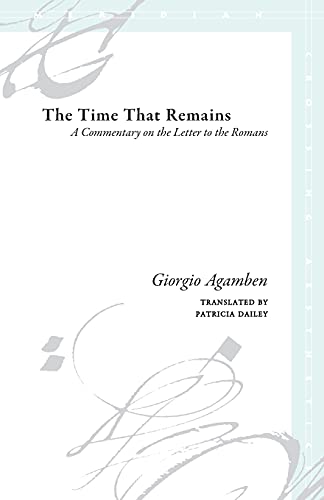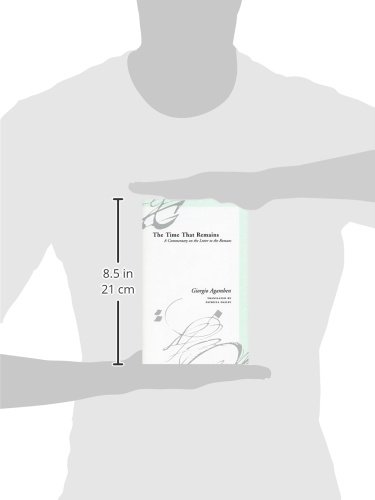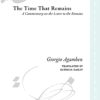The Time That Remains: A Commentary on the Letter to the Romans (Meridian: Crossing Aesthetics) Paperback – November 07, 2005 by Giorgio Agamben
PAPERBACK
[216 pages]
PUB: November 07, 2005
Description
Author: Giorgio Agamben
Brand: Stanford University Press
Edition: 1
Package Dimensions: 13x213x249
Number Of Pages: 216
Release Date: 07-11-2005
Details: Product Description
In The Time That Remains, Agamben seeks to separate the Pauline texts from the history of the Church that canonized them, thus revealing them to be “the fundamental messianic texts of the West.” He argues that Paul’s letters are concerned not with the foundation of a new religion but rather with the “messianic” abolition of Jewish law. Situating Paul’s texts in the context of early Jewish messianism, this book is part of a growing set of recent critiques devoted to the period when Judaism and Christianity were not yet fully distinct, placing Paul in the context of what has been called “Judaeo-Christianity.”
Agamben’s philosophical exploration of the problem of messianism leads to the other major figure discussed in this book, Walter Benjamin. Advancing a claim without precedent in the vast literature on Benjamin, Agamben argues that Benjamin’s philosophy of history constitutes a repetition and appropriation of Paul’s concept of “remaining time.” Through a close reading and comparison of Benjamin’s “Theses on the Philosophy of History” and the Pauline Epistles, Agamben discerns a number of striking and unrecognized parallels between the two works.
Review
”
The Time that Remains presents itself as an exegetical seminar on the opening line of the Letter to the Romans (“Paul, called as a slave of Jesus the Messiah, separated as apostle for the announcement of God”)… Agamben’s insightful close reading of the Pauline corpus sets this book apart from the more free-range grazing over the text modeled by Badiou and iek.” —
Radical Philosophy Review
“Agamben, through the close reading of Pauline letter and the comparison of W. Benjamin’s philosophy of history, gives us a fruitful key to better understand Western history and civilization. Philosophers and theologians will learn a great deal from reading this book.” —
Philosophy in Review/Comptes Rendus philosophiques
From the Inside Flap
In The Time That Remains, Agamben seeks to separate the Pauline texts from the history of the Church that canonized them, thus revealing them to be “the fundamental messianic texts of the West.” He argues that Paul’s letters are concerned not with the foundation of a new religion but rather with the “messianic” abolition of Jewish law. Situating Paul’s texts in the context of early Jewish messianism, this book is part of a growing set of recent critiques devoted to the period when Judaism and Christianity were not yet fully distinct, placing Paul in the context of what has been called “Judaeo-Christianity.”
Agamben’s philosophical exploration of the problem of messianism leads to the other major figure discussed in this book, Walter Benjamin. Advancing a claim without precedent in the vast literature on Benjamin, Agamben argues that Benjamin’s philosophy of history constitutes a repetition and appropriation of Paul’s concept of “remaining time.” Through a close reading and comparison of Benjamin’s “Theses on the Philosophy of History” and the Pauline Epistles, Agamben discerns a number of striking and unrecognized parallels between the two works.
From the Back Cover
In The Time That Remains, Agamben seeks to separate the Pauline texts from the history of the Church that canonized them, thus revealing them to be “the fundamental messianic texts of the West.” He argues that Paul’s letters are concerned not with the foundation of a new religion but rather with the “messianic” abolition of Jewish law. Situating Paul’s texts in the context of early Jewish messianism, this book is part of a growing set of recent critiques devoted to the period when Judaism and Christianity were not yet fully distinct, placing Paul in the context of what has been called “Judaeo-Christianity.”
Agamben’s philosophical exploration of the problem of messianism leads to the other major figure discussed in this book, Walter Benjamin. Advancing a claim without precedent in the vast literature on Benjamin, Agamben
Be the first to review “The Time That Remains: A Commentary on the Letter to the Romans (Meridian: Crossing Aesthetics) Paperback – November 07, 2005 by Giorgio Agamben”
You must be <a href="https://webdelico.com/my-account/">logged in</a> to post a review.
































There are no reviews yet.